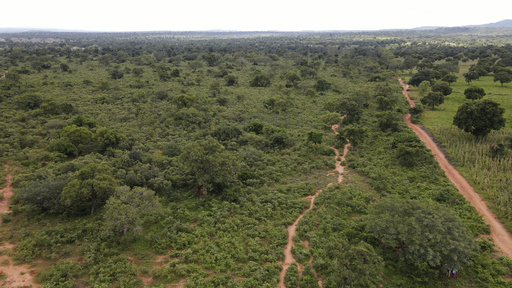
BAMAKO, Mali — Aida M’bo, who has dedicated years to serving as Mali’s environment minister, has recently turned her focus to an urgent mission: planting trees in a nation grappling with severe deforestation. Standing amidst the Zamblara forest, which has long been designated as a protected area, she expressed her concern about the impending threat to the landscape. “Deforestation is a critical concern in Mali,” she stated, highlighting the challenges that forests, like many in the expansive Sahel region, are facing.
She pointed out that excessive logging is a significant contributor to this crisis. Ironically, some of the individuals participating in a tree-planting ceremony were part of the problem. For instance, Salimata Diabate, a local resident participating in last month’s event, relies on selling firewood sourced from the forest in the Sikasso region—a vital agricultural zone in Mali. Despite her apprehensions about the dangers posed to the country’s woodlands, she underscored the harsh realities faced by rural populations who depend on firewood for cooking. “Affordable alternatives like cooking gas and solar panels are simply out of reach for many women in the countryside,” Diabate lamented.
Forest depletion is becoming an increasingly urgent issue throughout Africa as the Sahara Desert continues its southward expansion. A report by the nonprofit organization Tree Aid revealed that over the past thirty years, Mali has lost nearly 7,722 square miles (20,000 square kilometers) of its forested areas. To combat this issue, M’bo’s nonprofit, Energia, is receiving funding through the Great Green Wall—a continental initiative launched in 2007 that aims to plant trees in a nearly 5,000-mile stretch to help create a natural barrier against desertification exacerbated by climate change.
Unfortunately, the initiative has faced setbacks, as rising temperatures and reduced rainfall have contributed to the death of millions of trees, resulting in only 4% of the project’s initial goals being met. To realize the remaining objectives of the Great Green Wall, an estimated $43 billion will be required. In Mali, one of the significant hurdles remains the high dependence of the population on firewood.
Lassana Coulibaly, who resides in Senou near Bamako, spends his days collecting and selling wood purchased from individuals who cut it from local forests. “This is how we sustain our daily lives,” he shared, expressing skepticism about the imminent disappearance of the forest.
A 2019 assessment by the African Energy Commission noted that biomass, specifically firewood and charcoal, constituted 64% of Mali’s overall fuel consumption for household purposes. The legality of selling such wood remains in place, complicating efforts to safeguard the environment. Mali is notable for being one of Africa’s leading gold producers, yet it also ranks among the most underdeveloped countries globally, with nearly half of its population of 23 million living below the poverty threshold. This situation is compounded in rural areas, where many rely on subsistence farming, increasingly jeopardized by armed conflict and climate fluctuations.
Since 2020, Mali has grappled with an ongoing insurgency involving armed factions, some aligned with al-Qaida and the Islamic State group, along with experiencing two military coups. Furthermore, this year the Sahel region has faced unprecedented flooding, leading to over 1,000 fatalities and displacing hundreds of thousands across various countries.
Khady Camara, an environmental advocate based in Senegal, emphasizes the vital role forests play in mitigating the effects of climate change. They help manage water absorption to prevent flooding and capture carbon emissions that contribute to global warming. “We must prioritize our forests, while also establishing new wooded areas and supporting natural regrowth,” Camara insisted. Her organization, Vacances Vertes, has successfully planted 150,000 trees in Senegal.
Camara also emphasized the disproportionate impact of climate change on the Sahel region, often caused by actions well beyond Africa’s borders. “Africa only contributes 3% of global greenhouse gas emissions, with a staggering 90% stemming from the West,” she pointed out. “If we carry on this way, I fear for the future of Africa and its people.”
